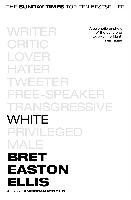'Thought-provoking' The Times
'Bracing and fun' Mail on Sunday
'Staggeringly good' Eric Idle
Candid, fearless and provocative, Bret Easton Ellis is best known for writing the era-defining novel American Psycho. In his first non-fiction book, Ellis opens up about who he is and sounds a warning about what he thinks is wrong with the world today.
In this wide-ranging book he tells personal stories from his own life and explores the consequences of his fame. He writes with razor-sharp precision about the music, movies, books and TV he loves and hates. He examines the ways our culture, politics and relationships have changed over the last four decades. He also offers a robust defence of truth and freedom, perhaps the two things under the greatest threat in our society right now.
White is blisteringly honest, powerfully opinionated, frequently funny and always entertaining. Whether you agree with him or not, Ellis is impossible to ignore.
'Funny and provocative . . . a winning mixture of incautious autobiography and caustic polemic, with plenty of sharp social observation thrown in . . . What a timely book this is'
Mail on Sunday
'Very good . . . the best thing he has published for years' Sunday Times

